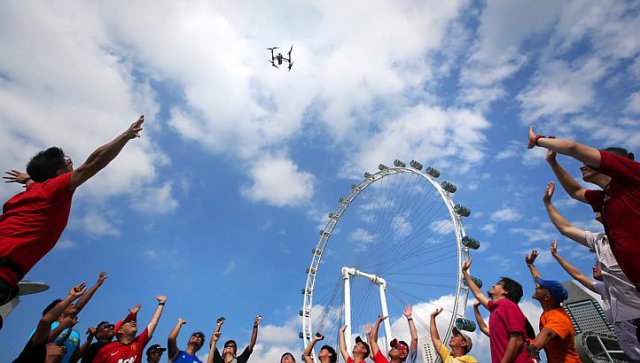The Singapore Parliament has just passed the Unmanned Aircraft (Public Safety and Security) Bill, which sets out guidelines for the safe flying of drones and enforcement against those who violate them. The new law, which amends the Air Navigation Act and Public Order Act, will take effect from next month.
During the debate on the Bill, a main concern of MPs was of operators who do not play by the rules and rogue drones which pose a risk to public safety.
Non-constituency MP Gerald Giam, of the Workers’ Party, said the Bill would not stop a “determined terrorist from using a drone to fly explosives, or chemical or biological agents into key installations or large crowds”.
He asked if there were systems in place to deal with rogue drones.
Mr Gan Thiam Poh (Pasir Ris- Punggol GRC) asked about the extent of enforcement in such circumstances. “Would the authorities be empowered to shoot them down if operators refuse to land them, or if they are beyond control and likely to cause harm and injuries on the ground?”
Transport Minister Lui Tuck Yew, who introduced the Bill last month, replied that enforcers will have the powers to assume control of an unmanned aircraft to either fly it, end its flight or land it.
“How this will be done will depend on the circumstances, taking into consideration the need to ensure public safety,” he added.
There have been close calls involving drones, with more than 20 incidents reported here since April last year, said Mr Lui. There were two instances when drones dropped on MRT tracks: last month at Commonwealth MRT, and last Saturday at Lakeside MRT. No services were disrupted nor damage caused to the tracks.
Another key issue is privacy. Nominated MP Benedict Tan pointed out there was hardly any mention of it in the Bill.
Mr Giam called for laws to protect a person’s privacy from drones being used to take photographs of people or private property without permission, while Mr Gan wanted the flying of drones to be banned in HDB estates as they would intrude on the privacy of flat dwellers.
Mr Lui said enforcement will be taken under existing laws such as the Penal Code and Protection from Harassment Act 2014.
He also assured MPs the committee set up to provide a comprehensive framework for drone use here will examine if present laws are adequate and whether any enhancements are needed.
But while MPs said the new law is timely, they also cautioned it must not be too onerous that it stifles the creative and innovative use of drones. Drones are now being used for commercial purposes, such as in photography, film-making and even to serve food to restaurant diners.
Mr Lui agreed that a “judicious balance” must be struck between security and letting drone operators experiment and innovate.
“It is the challenge and dilemma we face,” he added.
Source: Straits Times

